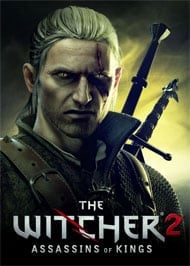A Dark Fantasy Magnum Opus
Geralt of Rivia is a Witcher, a professional monster-slayer created by genetic experimentation and harsh training. His nature sets him apart from humankind and has given him a strong, albeit slightly twisted, sense of personal ethics. Still, Geralt is only human at heart, prone to snap judgments, vulnerable to desire, and perfectly capable of making mistakes with catastrophic consequences. If this seems like a particularly deep characterization for the protagonist of a computer game, that’s exactly what sets The Witcher 2 apart from anything else on the market today.
The Witcher 2 is not a game for the faint of heart. It’s based on a series by Andrzej Sapkowski, the Fritz Lieber (or George R.R. Martin, if you must) of Polish fantasy literature. The game’s developers have done an excellent job recreating that world in the game: it’s one where life is brutal, war is frequent, and intolerance quickly boils over into hatred and violence. The game is rated M for far better reasons than the occasional sex scene: the player will encounter scenes of brutality, rape, torture, murder, and genocide during the game. As Geralt is only one man, he will not be able to prevent all of these crimes from occurring. It’s not that the game takes away Geralt’s power in order to shoehorn in plot development; in fact, Geralt tends to be fully able to take action at any time. It’s simply that the world is one that lives and breathes around the player, and the story marches on as other characters take action at the same time as Geralt.
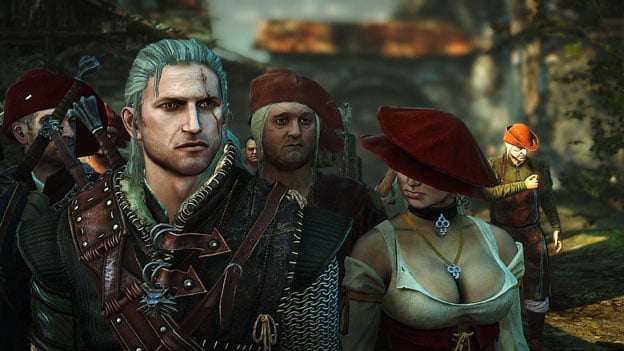
And what a ride that story is. Geralt begins the game imprisoned for a grave crime that he did not commit, and is thrust into a tangled web of war and regicide from which he knows he can’t escape until he clears his name. Through the story, Geralt must deal with the complex politics of the human nations of the North, in which nobles and peasants alike squabble for wealth and power. In the meantime, many of the oppressed non-humans have taken to guerrilla freedom-fighting, and their peaceful urban counterparts are suffering for it. On top of all that, Geralt is dealing with the slow return of his memory, which he lost when he came back to life from a death-by-pitchfork at the beginning of the first Witcher game. He’s in a relationship with the sorceress Triss, who loves him but also has her own goals and intrigues. It’s up to the player whether to keep her close or push her away during the course of the game.
Despite all these complex threads woven through the story, the game’s plot rarely lulls, and the player will be given important choices to make on a regular basis. The world of The Witcher 2 is filled with shades of grey, and the choices to be made in the plot are real choices, not simply “role-playing” between being good or evil. The consequences of choices may not be encountered until much later in the game, and often choices lead to both good and bad consequences for Geralt and the world around him. The player’s choices have a major impact on the game; characters live or die, a town either feasts or riots, and Geralt either woos a woman or does not. At the end of the game’s first act, Geralt will make a major choice that results in one of two completely divergent stories for the rest of the game. This is probably the most obvious in Act II (out of three acts), where the locations and quests are completely different.
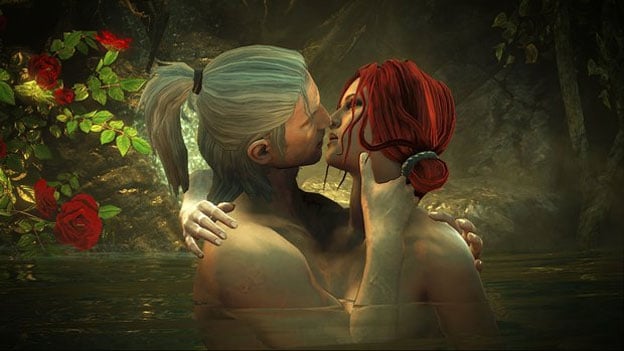
Of course, playing through a choice-filled story in a brutal fantasy world involves a lot of action, and The Witcher 2 isn’t sparse on combat. Fans of the first Witcher game will need to adjust, as this system is completely different from the original’s timing-based mouse click combat. Instead, The Witcher 2 features a full-fledged action combat system in which positioning and strategy are crucial on any difficulty setting past “Easy.” Geralt will need to use swordplay, alchemical concoctions that provide various buffs, and magical Signs to defeat most of the game’s foes. He even has traps and bombs available to him, and preparing to combat the kinds of foes Geralt is going to find tends to be very important. The monsters in the game are part of a larger ecosystem, and the player can learn how to best combat them. This can be done by reading books about their natures or doing “field research” by fighting and killing weaker members of a species, which will cause a journal entry about the creature to appear. Even simple monster-slaying quests will often require Geralt to learn about the monsters in order to destroy their nests or drive them away from the area. The player will usually have fair warning before taking on particularly difficult foes, which is good because drinking potions and crafting traps/bombs requires Geralt to be out of combat and in a safe place.
Combat controls well and is usually challenging yet fair, though sometimes it spikes in difficulty enough that the player may want to turn the difficulty setting down to easy. It’s possible to change the difficulty setting at any time, but the easy combat setting is usually too easy, while the normal setting can be just a bit too difficult. Players may wish instead to reload the game at an earlier juncture and spend more time preparing for the upcoming fight instead of turning down the difficulty. Beyond the difficulty setting issues, which may be changed in an upcoming patch, the only complaint about the combat system is that it suffers from a bit of input/animation lag. It takes Geralt too long to execute certain actions, especially casting Signs.
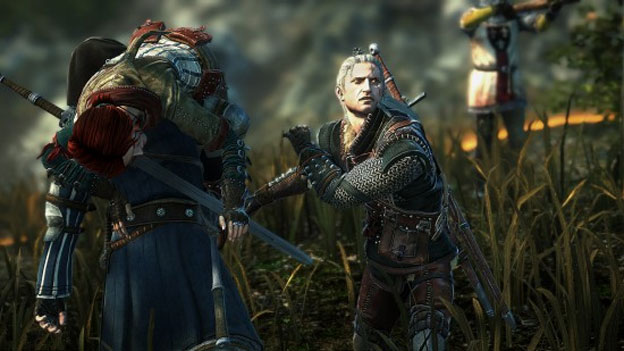
Beyond straight-up sword combat, The Witcher 2 features a few stealth segments, which provide some nice variety in gameplay, and a QTE-based fist fighting minigame which is fairly easy and fun to watch. Geralt is also able to compete in arm-wrestling and dice poker tournaments, which are a useful way to make money. There’s a full-featured crafting system in the game as well, with Geralt using materials gathered and skinned from monsters to create potions, bombs, traps, swords, and armor. Crafting (other than the frequently-obligatory potions) is mostly optional, but it produces some nice looking equipment for Geralt and can be very useful at higher difficulty levels. Although Geralt can carry 250-300 pounds before he has problems, stacks of iron ore and wooden planks weigh a fair amount, and the lack of a storage option in the game can be frustrating.
The few rough edges in The Witcher 2, however, are easily forgotten due to the sheer delight that the game’s full experience provides. It is, quite frankly, a gorgeous game, lovingly rendered with some of the best graphics ever seen in an RPG. Craggy castles, lush forests, murky swamps, rural villages, and stately cities are all rendered in impressive detail and look great even below “ultra” graphical settings. The models are excellent and full of character, especially Geralt, who manages to look like a man described as both frightening and irresistible. Characters both beautiful and ugly have been lovingly detailed, from the overdone makeup of a brothel madam to the droopy man-boobs of a flabby fist-fighter.
The sound design backs up the game’s visual atmosphere, especially the ambient sounds. The villages sound busy and bustling, and random villagers have an impressive amount of ambient dialog. When exploring dangerous locations, the grunting and rustling of monsters in the distance constantly reminds the player that Geralt is not alone. The voice acting is thankfully well-done, lending credence to the game’s writing, which is good but not always top-notch. Extra acclaim should be given to the voice actors of the game’s dwarven characters, who bring that earthy, gleefully profane race to life and provide some of the game’s most amusing moments without toppling fully into stereotype.
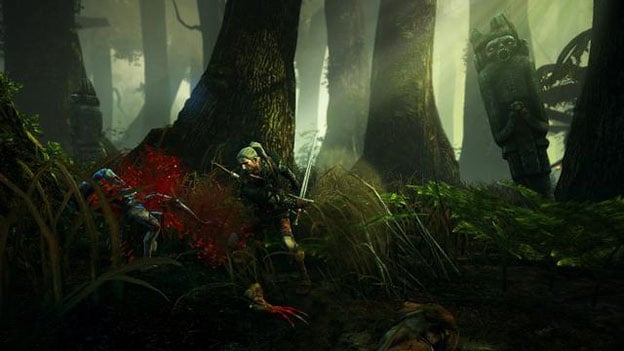
Only a few small criticisms can be leveled at The Witcher 2’s aesthetics. Some conversational animations still look a bit stiff, a problem that no game has yet managed to overcome. There’s a lack of diversity in the game’s young female characters, who seem almost uniformly thin and good-looking until they suddenly morph into fat baggy grandmas. Soundwise, another pass of volume control could be used on the voice acting, especially since Geralt is sometimes so quiet that subtitles are practically required. It should be understood, however, that these are very small nitpicks of an incredibly well-designed and executed fantasy world that stands at the top of the RPG genre.
The Witcher 2 is a meaty game, and any playthrough that isn’t completely rushed should take at least thirty hours. Most gamers will probably take forty to sixty hours, depending on how many sub-quests are taken on and how much exploration is done. There is already a free downloadable side quest available for the game, and developer CD Projekt promises that future DLC will be free as well. The large number of meaningful choices provides a great deal of replay value, and most players will want to keep a save game before the Act I choice in order to experience the biggest choice-based storyline difference. It’s an impressive amount of value for the price, and the game will keep most players busy for quite some time.
It’s difficult to fully emphasize how immersive and impressive The Witcher 2 is. With their second game, CD Projekt has become the new champion of the Western RPG genre, blending a complex yet compelling story featuring truly impactful role-playing choices with a near-perfectly executed world. Other developers will likely be looking to The Witcher 2 for inspiration for years to come, and no fan of the Western role-playing genre should miss this game. Stop making excuses, RPG fans, and go upgrade that computer. This game is worth it.
RATING OUT OF 5 RATING DESCRIPTION 5.0 Graphics
The Witcher 2’s graphics are some of the best ever seen in an RPG—a shining example of what can be done with an engine built for the PC from the ground up. 3.7 Control
The control scheme is strong and customizable, but could sometimes be more reactive to command entry. 4.2 Music / Sound FX / Voice Acting
Excellent sound design and quality English voice acting, marred only by a lack of volume consistency between VA performances, particularly an overly-quiet Geralt. 4.5 Play Value
The game’s length is meaty without overstaying its welcome. A major choice in Chapter I completely diverges the storyline, so a second playthrough can explore a very different story. 4.5 Overall Rating – Must Buy
Not an average. See Rating legend below for a final score breakdown.
| Review Rating Legend | |||
|---|---|---|---|
| 0.1 – 1.9 = Avoid | 2.5 – 2.9 = Average | 3.5 – 3.9 = Good | 4.5 – 4.9 = Must Buy |
| 2.0 – 2.4 = Poor | 3.0 – 3.4 = Fair | 4.0 – 4.4 = Great | 5.0 = The Best |
Game Features:
